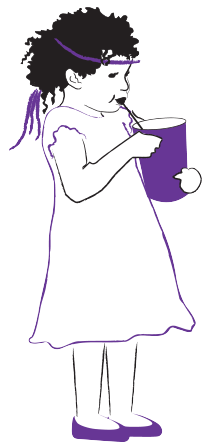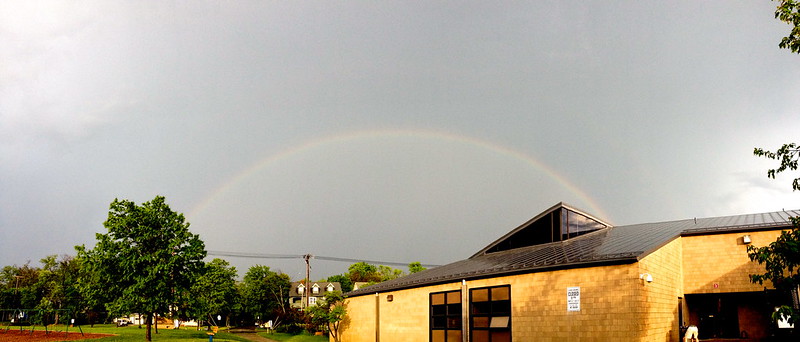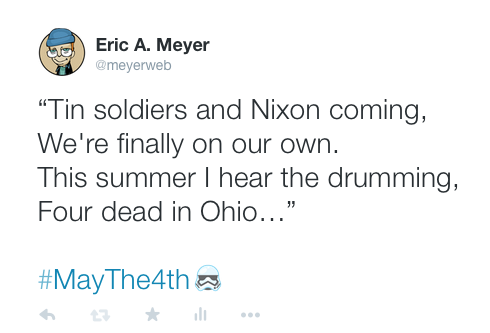Yesterday was the eleven-month anniversary of Rebecca’s death. I’ve been trying not to focus on those monthly anniversaries, but this one stuck out for me. Because in a month — thirty days, as I write this — it will be both the first anniversary of her death, and the day she would have turned seven.
I haven’t really written directly about the grieving process since late March, because it’s been in a stable pattern and nothing has really changed. Kat and I still grapple on occasion with the question of whether this is a nightmare or a post-dream. Are we having a nightmare that our daughter died, and we’ll finally wake up; or did we dream that we had a middle daughter, and have since woken up? Of course neither is true. She came to us, and grew, and died. It’s just so hard to come to peace or acceptance or even just comprehension that the mind hunts for an escape hatch, some way of making some part of it not true.
Don’t take this as intimation that we spend every waking second in agony, paralyzed by grief and shock. Those periods of irreality and escape-seeking are just that: periods of time. Not all the time. Most of each day, I function normally, and honestly don’t think about what happened. There’s work to do, projects to start or complete, errands to run, books to read, kids to raise. These things all take precedence in their own ways, and Kat and I are both committed to being as present as possible in our lives. We don’t deny what happened, but we don’t fetishize it, either. Life cannot stop because a life stopped. It’s not how either of us could live, even for ourselves, and we have more than ourselves to consider.
Some days are more difficult than others, of course, but for whom is that not true? We all get through life one day at a time.
One of the things that has really helped us as a family, and Kat and me as parents, has been to go on family vacations. Some went better than others. A short trip we took to Amish Country in late July of 2014 was probably too soon. Our annual August trip to New Jersey, coming as it did on the first anniversary of Rebecca falling ill, was both helpful and difficult; and maybe the difficulty was part of what made it helpful. The trip we took to Gatlinburg/Pigeon Forge just after Christmas was just about right, in terms of timing, and was definitely a huge boost to us emotionally.
These escapes from the normal routine of home and calendar, where we could just concentrate on being together and doing things together and not having any particular demands on us, were incredibly helpful to the healing process. Friends told us after our trips that we seemed more relaxed, less haunted. The time we spent together helped us figure out how to be a new family, without all the distractions and chores of everyday life.
The other thing that Kat and I in particular appreciated about our trips is how we could make Carolyn and Joshua the center of the experience. When Rebecca was being treated, and then when she was dying, we did what we could to make Carolyn and Joshua feel not marginalized, but there was no way to avoid it. Mommy and Daddy went on a two-month trip to Philadelphia with Rebecca, not them. We went with her to the hospital, not them. We worried about her temperature and bruising level and energy, not theirs. People made banners and posters and cards and healing stars for Rebecca, not them. Friends and family came to see us because of Rebecca’s cancer, not because of them. Make-A-Wish granted Rebecca’s wish, not theirs. People came to pay respects to the memory of Rebecca’s life, not the ongoing reality of their lives.
How could they not feel marginalized?
Kat and I worried about this all the way through, guided to some degree by the insights I had from my own childhood, and tried to counter it as best we could. Kat went on theater dates with Carolyn, and lunch dates with Joshua. I played games they liked, and took them to parties. Regardless, they knew what weighed most on our minds, and we never tried to deceive them or tell them they were wrong.
But those trips, after Rebecca was dead, could be all about them. They were central again. We went to the Jersey shore, and did old favorite activities as well as tried new things. We went to Disney and granted their wishes as best we could, getting them to special character events and letting them stay up to watch the fireworks. We took them to the museums and shops and ski slopes in Gatlinburg and Pigeon Forge, picking the things they wanted to try out. We made them feel special again.
You can’t imagine how great a gift that is, both for them and for us, unless you’ve been through this yourself.
That’s a gift that Kat and our good friend Karla want to give to families who are going through this.

That’s why, a week ago today, they launched Rebecca’s Gift, a 501(c)(3) non-profit dedicated to providing healing family vacations after the death of a child. Rebecca’s Gift is accepting donations in support of that mission, and has its first fundraiser scheduled for this November.
Their goal is to raise enough money to send two or three families on healing trips in the summer of 2016; that is, summer of next year. At first, the scope of Rebecca’s Gift will be narrow by necessity: eligible families will be those who had a child die of cancer between six and 24 months before the trip is taken, and who have surviving children age 18 or younger. Rebecca’s Gift will work with partner organizations to identify families who need this support. They don’t plan to take on anything more ambitious than that to start, in order to make sure those first trips are everything they can be.
As for the future, we’ll see. The hope is that this will one day be open to more than a few families per year, open to families whose child died from something other than cancer, and perhaps open to parents who have no other children. If Rebecca’s Gift grows strong enough to do those things, then I feel confident they will. Those are all questions for the future. For now, they’re focused on making sure they can help families who need the same time away to reconnect, rebuild, and relax. Even if it’s just for a few days.
If you can help, I know your support will be welcome.


